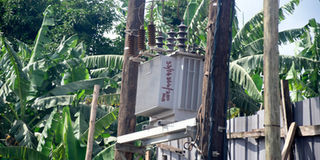Demand for electricity declines by 10 per cent

Projected increase. While Umeme expects a drop among large scale consumers, it has projected an increase among domestic consumers. PHOTO BY EDGAR R BATTE
Since the lockdown in March, demand for electricity has dropped by 10 per cent.
According to Uganda Electricity Transmission Company Limited (UETCL), there has been a marginal drop in demand for electricity since the country went into lockdown in March.
“The demand for electricity has dropped by 10 per cent since the lockdown started. It has fallen from 680 megawatts (MW) to 600MW,” Ms Pamella Byoruganda, the UETCL principle public relations manager, told Daily Monitor.
UETCL supplies bulk electricity from generating plants to distributors such as Umeme.
President Museveni on March 30 initiated a total lockdown in an effort to curb the spread of Covid-19 but directed utility companies not to disconnect consumers.
However, the directive has done little to save demand since the lockdown culminated into closure of a number of businesses.
Reduced manufacturing
Industries, which consume more than 60 per cent of the country’s electricity have since the lockdown reduced production.
Mr Daniel Birungi, the Uganda Manufacturers Association executive director, said the 10 per cent drop might not be a true reflection because industrial production has dropped tremendously.
“Others are working on a much reduced capacity and are now doing one shift because of the curfew. The addressable market for manufacturers has fallen anywhere between 50-70 per cent,” he said, noting the drop is higher.
Mr Selestino Babungi, the Umeme managing director, told Daily Monitor that while figures for electricity consumption since Covid-19 have not yet been tallied, limited economic activity, which moves in tandem with power demand, is expected to create a reduction in consumption.
“Some of the manufacturers are not working and the city centre, which consumes 10 per cent of our total demand has very little activity so demand for electricity is moving according to those consumption areas,” he said.
However, the increased number of people staying home on account of the lockdown, he said, is expected to create an increase in demand by domestic consumers.
Strain on tariff
The energy sector has faced multi-faceted challenges during the Covid-19 pandemic both domestically and globally.
Despite the low demand for electricity, there is a revenue requirement to pay power sector players for their investments.
As such, further reduction in demand could lead to an increase in tariff in order to meet revenue obligations the country has to private investors.



